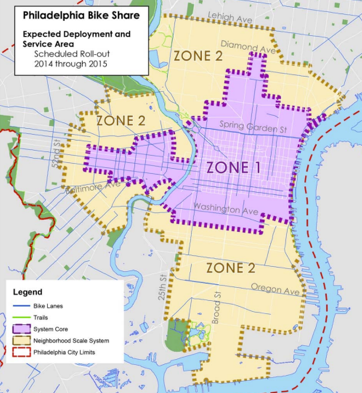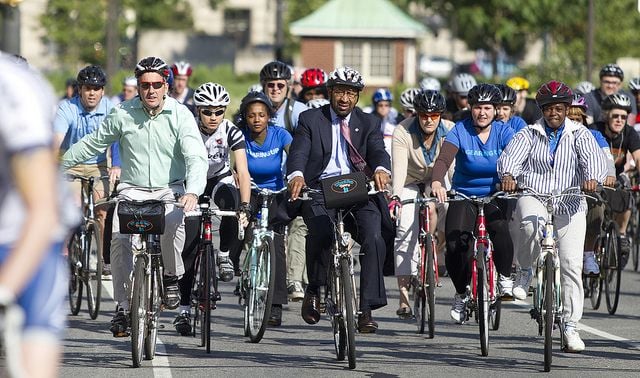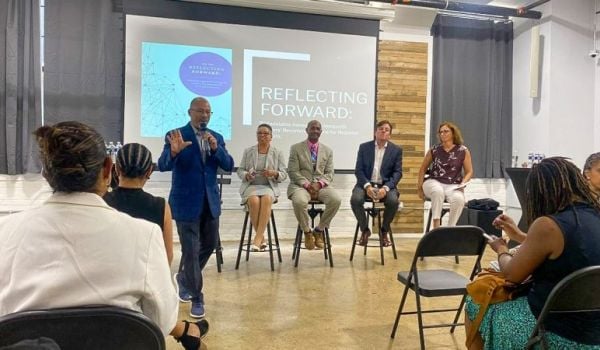Everywhere from the Bay Area to Ann Arbor, Mich. to Georgetown University is launching a bike sharing program these days, and the country’s fifth-largest city doesn’t want to be left out. According to a business plan posted to a new official webpage last week, “implementing a top-quality system is imperative as Philadelphia strives to improve its status as a city of choice.”
Mayor Michael Nutter has committed $3 million from Philadelphia’s capital funds to pay for part of a bike share program slated to open in fall 2014. But the cost is expected to reach some $15 million at a time when the city is wrestling with its own economic woes. How to go about paying for a forward-looking transportation experiment, especially during budget crunch time?
One solution is getting property owners to kick in land or money to sponsor one or more of the proposed 185 docking stations. Under this approach, recently put forth by the mayor and transportation officials, the cost won’t just be carried by a “title sponsor” — like Barclays Cycle Hire in London or New Balance Hubway in Boston — but by sponsors of individual stations.

Philadelphia’s Request for Statement of Interest asks landowners to pinpoint where, exactly, they can fit a dock of about seven feet by 35 feet, big enough to hold 20 bikes. Alternatively, sponsors can opt to simply cover the cost of buying and installing a station. “Businesses, property owners and institutions who decide to underwrite stations on or near their property, “reads the proposal, “will be assured placement when the system rolls out in late summer 2014.” (The plan is still in its early stages, but in peer cities stations run anywhere from $55,000 to $75,000.)
Pre-recruited local companies and institutions met the city’s station plan with huzzahs. “Sponsoring and hosting a bike share stations at the Cira Centre and our other properties in Philadelphia is an obvious business decision,” Jerry Sweeney, CEO of Brandywine Property Trust, was quoted as saying in the city’s press release. “Property owners who are serious about providing transportation options and quality amenities to their tenants are going to support bike share.” The University of Pennsylvania also said that it expects to “be home to several stations.”
Of course, putting stations where those with land or money are eager to have them raises questions, especially when it is Philadelphia’s ambition to “become a leader among US bike sharing systems in garnering participation among low-income and minority users.”
“While there is strong funding potential for sponsoring stations in and around the city core from private companies or major institutions, many stations, especially outside Center City, will not be able to rely on such sources,” reads the business plan. Where sponsors don’t step up, the city says it will tap civic spaces — recreation centers, libraries, etc. The city has also posted a map where locals can suggest station locations.
At launch, the Philly bike share service zone is set to stretch “from the Delaware River into West Philadelphia, from the Navy Yard through Center City to beyond Temple University’s main campus in North Philadelphia.” City officials argue that more economically restricted people will live in the service zone than in any other city with bike share — though as Philadelphia City Paper reports, one city transportation rep concedes that this is “partly a reflection of how poor Philly is.” Monthly or yearly rates are still up in the air, but daily rates are pegged at “much less than $10.”
New York City’s strategy, instead, was to pursue one or two big fish. It soaked its system in blue paint as an homage to the $41 million over five years that Citibank has given to have its logo emblazoned on everything from bikes to stations to key fobs. MasterCard is also Citi Bike sponsor, paying $6.5 million to have its mark on kiosks and receipts, though you’d be hard pressed to find anyone who knows it.
Philadelphia is tapping New York’s branding experience as part of its funding mix. “For a title sponsor, extensive local and national exposure will be gained by sponsoring the bike share system,” reads the business plan. “Bike share remains a relatively new mode of transportation, and new systems get extensive media exposure; a Google search of news articles referencing New York’s CitiBike, returns over 2,000 results.”
Citibank’s seeming ownership of Citi Bike, though, has caused some angst in New York. People have complained about commercializing public sidewalks, and some are pushing the city to put up public funds to expand the system to Queens and the Bronx.
Maybe, though, Philly is onto something, and riding a Comcast bike from Brandywine Property Station to Parkway Central Library Station will convince people that they’re really a part of a public-private partnership. The economic dynamics of bike share are understudied, at least in the U.S. A study by professors from the National University of Singapore and MIT found that, if getting people on bikes is the goal, money is better spent on improving the conditions for bike riding than on bike share programs.
That said, the report admits, “much of cycling infrastructure is a public good which does not attract private investment.”

Nancy Scola is a Washington, DC-based journalist whose work tends to focus on the intersections of technology, politics, and public policy. Shortly after returning from Havana she started as a tech reporter at POLITICO.
















